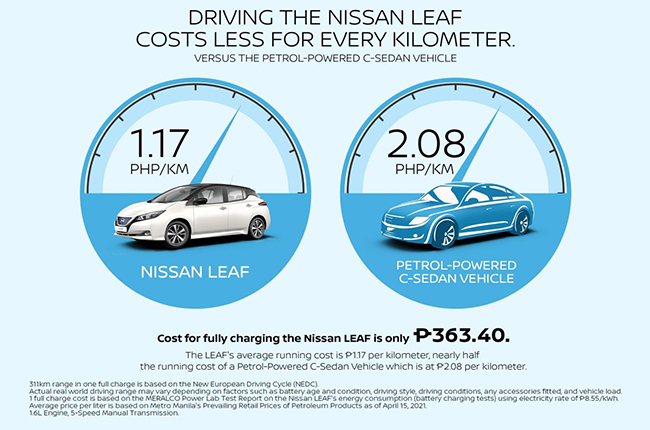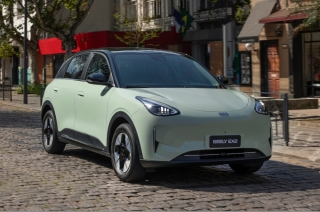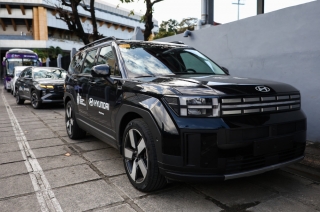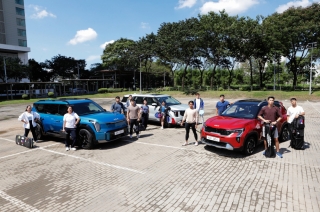
The Nissan LEAF is the Japanese brand’s latest electric vehicle to enter the local automotive market. It presents itself as a new mode of transportation that doesn’t come with the downsides of having an internal combustion engine. That said, Nissan Philippines is giving you a couple of reasons why you should get a LEAF and why it is a worthy investment for a futuristic mode of transportation.
Low running costs

Unlike a fossil fuel-powered vehicle that is susceptible to changes in pricing, the Nissan LEAF is immune to these changes. Based on the tests done by the MERALCO Power Lab, the electric hatchback only costs the user P363.40 to charge to full. That is substantially less than what it would cost to full tank a gasoline or diesel vehicle. This gives the Nissan LEAF a running cost of about P1.17 per kilometer.
The Nissan LEAF can be charged at home or at the brand’s supercharging stations at select dealerships. If you charge the electrified hatchback at home expect to reach fully charged within 18.5 hours. While this may seem like a lot of time, you can easily just top off what amount of range that you use and charge the vehicle while not in use. Owners can also choose to charge their Nissan LEAF at select EV dealerships using the brand’s supercharging stations. These stations can easily fully charge the electric hatchback in a matter of 40 to 60 minutes. The service is also free according to Nissan Philippines.
Lower maintenance costs

Nissan Philippines states that the LEAF can cost up to 23% less to maintain compared to a mid-size sedan over a 5 year period. The Japanese automaker has also stated that the parts for the electric vehicle can cost up to 39% less than internal combustion-powered vehicles. Nissan says that this is partly due to the fact that the LEAF has fewer moving parts and fewer consumable materials which makes it easier to maintain. This also means fewer trips to the service center for oil changes and tune-ups.
A worthy investment
Nissan states that together with its low running and maintenance costs the LEAF also comes with a great set of warranties. The battery for the electric vehicle has an 8-year or 160,000 km warranty, while the vehicle itself is covered by a 3-year or 100,000 km warranty whichever comes first. With all the benefits listed by the Japanese automaker, this makes the Nissan LEAF a worthy investment for those who want to try out electrified mobility.
Latest News
-
Geely’s EX2 EV headed to Australia — is a Philippine launch possible? / News
The Geely EX2 is confirmed to go on sale in Australia in 2026. Could a launch in the Philippines also be on the cards?
-
Hyundai Motor Philippines is the FIFA Futsal Women's Teams' official mobility partner / News
Hyundai Motor Philippines strengthened its partnership with FIFA through its support of the FIFA Futsal Women's Teams.
-
Kia Philippines backs EJ Obiena as Atletang Ayala continues championing Filipino athletes / News
Kia Philippines strengthens its support for EJ Obiena, backing the Olympian with dedicated mobility at home and abroad.
Popular Articles
-
Electric Vehicles in the Philippines for under P1 million
Jerome Tresvalles · Aug 19, 2025
-
Top 3 Cars For Every Lifestyle—What Cars Are Right For You? | Behind a Desk
Caco Tirona · Apr 24, 2024
-
5 Tips to Maximize Fuel Efficiency
Jerome Tresvalles · Sep 09, 2024
-
Five driving habits that are draining your fuel tank
Jerome Tresvalles · Jun 24, 2025
-
Can engine braking harm your engine?
Jerome Tresvalles · Sep 11, 2025
-
Do electric cars even need maintenance?
Jerome Tresvalles · Oct 23, 2024
-
Best vehicles for an active outdoor lifestyle
Shaynah Miranda · Jul 25, 2024
-
How to drive different types of vehicle transmissions
May 23, 2024
-
5 easy ways to keep your car interior clean
Allysa Mae Zulueta · Nov 15, 2021
-
How to survive Metro Manila traffic
Earl Lee · Aug 16, 2022



